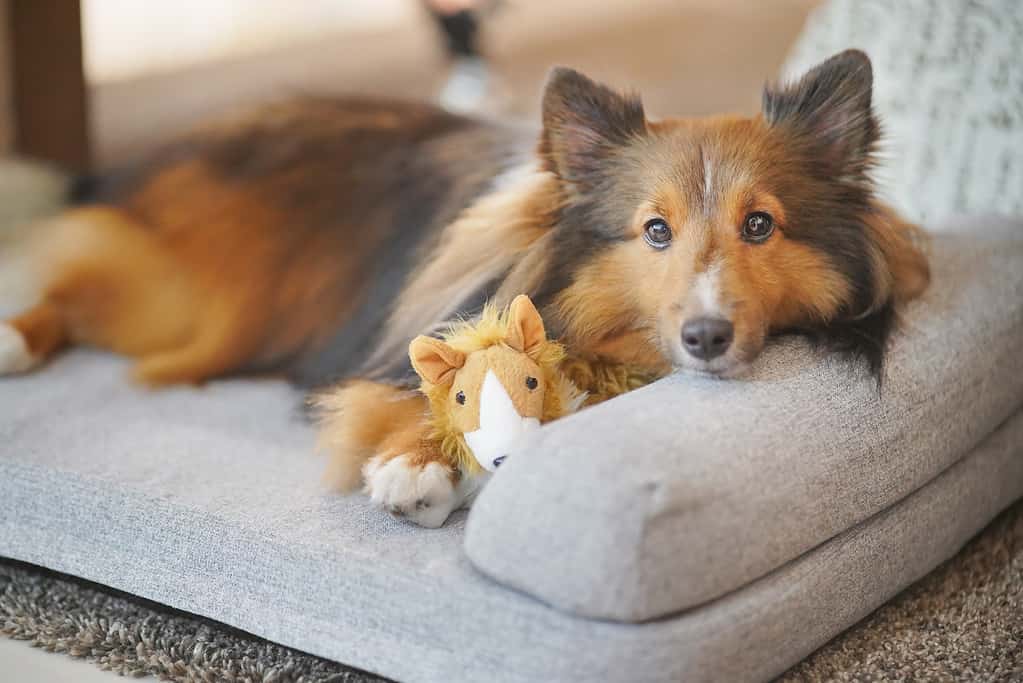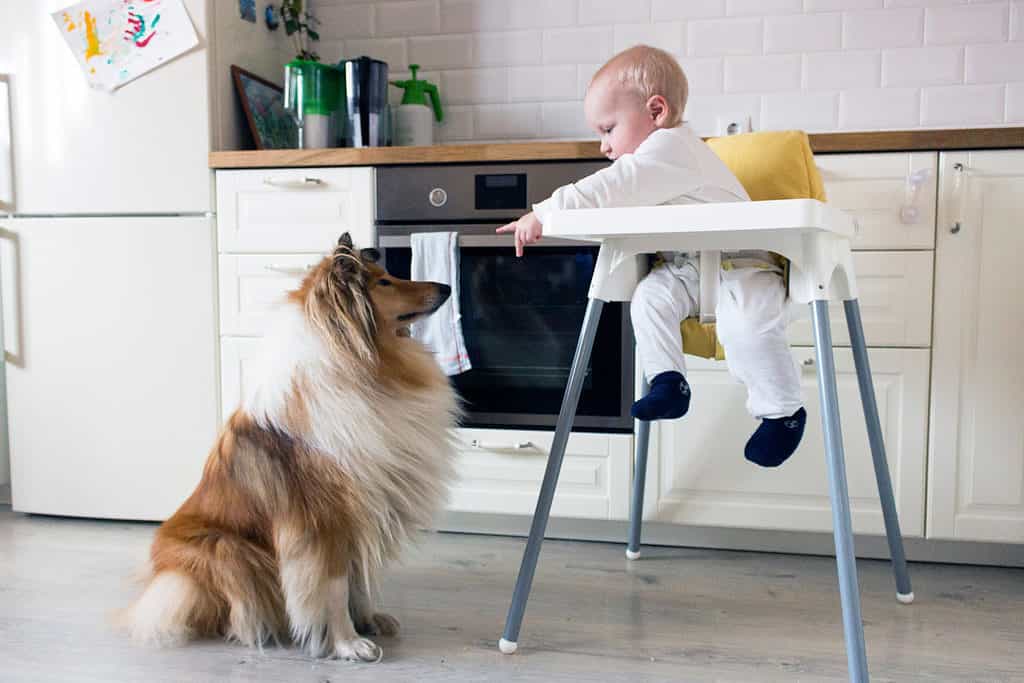Shetland sheepdogs, or shelties, are beautiful herding dogs. However, Shetland sheepdog owners tend to share some common complaints about these pups!
Common complaints about shelties include excessive barking, nipping at heels while trying to herd people or pets, and a tendency to chase things that move quickly, like cats or cars. They’re also clingy, energetic, and sensitive. Shelties are prone to some genetic health problems.
In this article, we’ll address eight common Shetland sheepdog complaints, how to solve some of them, and whether the breed is right for you.
Are Shelties Good Dogs?

Shelties tend to make good family dogs, but they aren’t suited to every household.
©Jiras Pipatwasin/iStock via Getty Images
First, let’s note that shelties aren’t bad dogs by any means! However, they aren’t right for everybody.
A Sheltie is a good dog for you if you have the time and energy to provide moderate daily exercise, have a family that can spend most of the day with the dog, and you don’t mind a dog that’s protective and often wary of strangers.
If it’s important to you to have a dog that behaves off-leash in unenclosed spaces, you cannot tolerate barking, or you don’t want a clingy dog, shelties aren’t the right match.
We’ll dig deeper into their faults below.
#1: They’re Prone to Chasing and Nipping

Without proper training, your sheltie might chase moving objects, pets, or people.
©Rita_Kochmarjova/Shutterstock.com
One way that herding dogs herd livestock is by nipping at their heels. This is a common trait in shelties that can be hard to break since it’s instinctual!
They also tend to chase anything that moves, which includes prey or traffic while off-leash. It can also include children or cats in the home, which can be dangerous especially when accompanied by nipping.
That said, good training and management can resolve this issue. When in doubt, it helps to call in a professional force-free or positive reinforcement dog trainer to help.
#2: Shelties Bark a Lot!

Shetland Sheepdogs tend to be very vocal.
©Utekhina Anna/Shutterstock.com
As a guarding breed, shelties tend to bark at strangers. They might also bark at other things that excite them, such as other animals outside. This barking can be excessive, especially if the dog isn’t getting enough exercise, mental enrichment, or training.
Funnily enough, the first step to stop excessive barking is to teach your dog to speak on command. Once they’ve learned that, you can teach them to be quiet in a distraction-free environment–and then slowly begin adding distractions, such as a brief knock on the door, once they get the hang of it.
This does take time and patience, though, and dealing with excessive barking isn’t for everybody!
#3: They’re Energetic and Time-Consuming

Shelties require a lot of time and attention throughout their lives and especially as puppies.
©Lisjatina/Shutterstock.com
Shetland sheepdogs don’t require an excessive amount of exercise, but they will need daily walks and playtime.
They also require a lot of mental enrichment, as they’re smart dogs who get bored quickly without something to do. Otherwise, shelties will find their own fun by barking at passersby.
Sniffing on walks, eating from slow feeders or puzzle toys, daily training, and nose work games will all help to prevent boredom in shelties. You can also buy a herding ball to satisfy their herding instincts, or a flirt pole to give them something safe to chase!
The rest of your time will be spent simply keeping your sheltie company, as they often cannot handle being alone for long periods.
#4: They’re Shy

Many shetland sheepdogs are shy or reserved around new people.
©Tatyana Pronina/Shutterstock.com
It’s important to socialize your Shetland sheepdog so that they don’t grow too timid or fearful of strangers. That said, every dog has their own personality, and shyness is common in the breed.
Shelties are also incredibly protective of their homes and families, which adds to their wariness of strangers.
They don’t need to meet everyone on their walks, but instead, teach them not to bark or lunge when they see someone new. Sitting in new environments and just watching the world go by without barking provides great socialization for shelties as well.
#5: Shelties are Clingy

Shelties love spending time with their families and can be too clingy for some individuals.
©Ekaterina_Kuzmina/Shutterstock.com
Known as velcro dogs, Shetland sheepdogs tend to cling to their favorite people. They’re prone to separation anxiety because of this.
Avoiding separation anxiety can be a balancing act. Dogs who are never left alone are often incredibly fearful when it does inevitably happen, so it’s important to teach your sheltie to be alone for short periods (slowly working up to a few hours at a time).
However, leaving them for too long can also leave them fearful. For most shelties, a full workday with no one home is going to be too much. They prefer to live with families where someone is around most of the day.
Remember that you want to build positive associations with being alone, so start small and work your way up as your dog gets comfortable.
#6: Shelties are Sensitive Dogs

They do best in stable, peaceful homes since they react poorly to negative environments.
©iStock.com/11Audrey11
They tend to pick up on human emotions easily and sense any drama or turmoil happening in the home. Shelties are easily stressed and take notice of your tone with them, meaning just a slight raise in your voice can be upsetting.
Of course, we can’t completely avoid being upset around our dogs! But, it’s important to avoid aversive training techniques and to try not to scold your dog for misbehavior. Instead, set them up for success, redirect poor behaviors, and remove yourself or others if your dog is getting too hyper and nipping heels.
You’ll also want to give your pup a place to go when they need to decompress in a quiet environment, such as a crate placed in a bedroom. Teach the whole family to leave the dog alone when they’re in their quiet spot.
#7: They Have Long Coats that Shed Plentifully

A sheltie’s beautiful coat takes work to upkeep.
©Lidia Belyaeva/iStock via Getty Images
You’ll need to brush your sheltie at least once a week to keep their coat healthy and free of mats. During shedding season twice a year, they’ll need to be brushed multiple times a week.
Mats can be very painful as they tug on the skin, and can cause bruising and skin infections when severe. Shelties also should not be shaved, as this damages their double coat. Double coats help dogs heat and cool their bodies, protect them from the sun, and more!
If you’re okay with lots of grooming upkeep but don’t like to clean, shelties may be the wrong breed for you. They also shed pretty heavily, especially during shedding season.
#8: They’re Prone to Health Problems

Shetland Sheepdogs often have sensitive stomachs and may be fussy eaters.
©Filmbildfabrik/Shutterstock.com
Lastly, Shetland sheepdogs are prone to a variety of health problems. If you’re purchasing a puppy from a breeder, ensure that both parents have passed the recommended genetic health tests and have CHIC numbers that allow you to verify the results.
Some things to watch for in shelties include:
- Anxiety
- Sensitive stomach
- Hip dysplasia
- Patellar luxation
- Eye conditions
- Thyroid disease
- Heart disease
- Dental disease
Remember that all breeds have genetic health issues associated with them, and you’ll never be able to avoid health problems completely.
Before adopting any breed, it’s important to either have a large savings account for veterinary expenses or pet insurance to cover sick and emergency visits. Please keep in mind that pet insurance often doesn’t cover routine care like you’d expect from human health insurance.
Overall, the primary problems with shelties are their herding instincts causing misbehavior, their fur shedding pretty heavily, and their clinginess making them difficult to leave alone. They require time and patience to raise, but if you can handle this breed, they’re the perfect additions to many families!
The photo featured at the top of this post is © molka/iStock via Getty Images
Ready to discover the top 10 cutest dog breeds in the entire world?
How about the fastest dogs, the largest dogs and those that are -- quite frankly -- just the kindest dogs on the planet? Each day, AZ Animals sends out lists just like this to our thousands of email subscribers. And the best part? It's FREE. Join today by entering your email below.
Thank you for reading! Have some feedback for us? Contact the AZ Animals editorial team.







